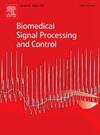Research on stack-based LSTM adaptive ECG mapping method
IF 4.9
2区 医学
Q1 ENGINEERING, BIOMEDICAL
引用次数: 0
Abstract
Sudden cardiovascular diseases impose a significant burden on individuals’ health and life, with high mortality and disability rates. Most portable electrocardiogram collection devices collect ECG signals in vector ECG format, which differs from standard ECG signals, making it difficult for doctors to diagnose diseases. To address this issue, we designed a human-engineered “palm” rapid ECG collection system based on flexible sensing materials. Additionally, we implemented an individualized adaptive ECG mapping algorithm using a stack LSTM network to map non-standard ECG signals collected by the portable ECG collection front-end to standard signals. To evaluate the performance of our approach, we conducted a comparative analysis experiment on ECG data collected from 30 participants. Our results show that the correlation between the “palm” rapid ECG graph obtained using our proposed mapping algorithm and the standard 12-lead ECG graph was 97.45 %, with a RMSE of 0.09 mV. These findings indicate that our approach has significant implications for optimizing signal analysis of wearable ECG collection devices.
基于堆栈的LSTM自适应心电映射方法研究
突发心血管疾病对个人健康和生命造成重大负担,死亡率和致残率很高。大多数便携式心电图采集设备采集的心电信号都是矢量心电格式,与标准的心电信号不同,给医生诊断疾病带来了困难。为了解决这个问题,我们设计了一个基于柔性传感材料的人工工程“手掌”快速ECG采集系统。此外,我们利用堆栈LSTM网络实现了一种个性化自适应心电映射算法,将便携式心电采集前端采集的非标准心电信号映射到标准信号。为了评估我们的方法的性能,我们对30名参与者的心电图数据进行了比较分析实验。结果表明,采用该映射算法得到的“手掌”快速心电图与标准12导联心电图的相关性为97.45%,RMSE为0.09 mV。这些发现表明,我们的方法对优化可穿戴ECG采集设备的信号分析具有重要意义。
本文章由计算机程序翻译,如有差异,请以英文原文为准。
求助全文
约1分钟内获得全文
求助全文
来源期刊

Biomedical Signal Processing and Control
工程技术-工程:生物医学
CiteScore
9.80
自引率
13.70%
发文量
822
审稿时长
4 months
期刊介绍:
Biomedical Signal Processing and Control aims to provide a cross-disciplinary international forum for the interchange of information on research in the measurement and analysis of signals and images in clinical medicine and the biological sciences. Emphasis is placed on contributions dealing with the practical, applications-led research on the use of methods and devices in clinical diagnosis, patient monitoring and management.
Biomedical Signal Processing and Control reflects the main areas in which these methods are being used and developed at the interface of both engineering and clinical science. The scope of the journal is defined to include relevant review papers, technical notes, short communications and letters. Tutorial papers and special issues will also be published.
 求助内容:
求助内容: 应助结果提醒方式:
应助结果提醒方式:


